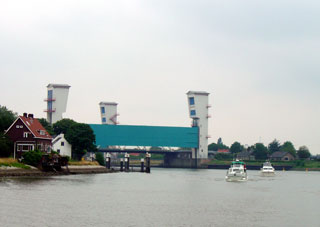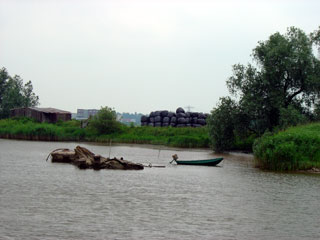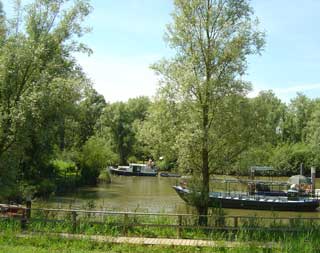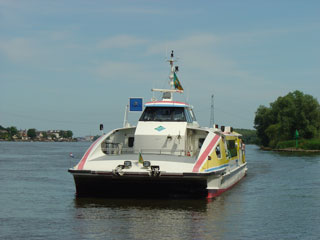Gouda to Dordrecht
Saturday 25th June
 After
the obligatory three days in Gouda, made necessary by the unfeasibly cheap
three day discount, we set off this morning for Dordrecht. As the Gouda
town centre bridges do not operate on Sundays except in July and August
we expected a mass exodus and started an early rush for the solitary (free)
water hose. We finally got underway promptly at 9(.30)am after a comprehensive
mopping up operation in the cockpit. The hot, sultry weather had come
to a sudden end during the night with a heavy, thundery storm which had
caught the fleet in varying degrees of sun canopy which were less than
waterproof.
After
the obligatory three days in Gouda, made necessary by the unfeasibly cheap
three day discount, we set off this morning for Dordrecht. As the Gouda
town centre bridges do not operate on Sundays except in July and August
we expected a mass exodus and started an early rush for the solitary (free)
water hose. We finally got underway promptly at 9(.30)am after a comprehensive
mopping up operation in the cockpit. The hot, sultry weather had come
to a sudden end during the night with a heavy, thundery storm which had
caught the fleet in varying degrees of sun canopy which were less than
waterproof.
The bridges do not operate to a specific schedule at the weekend and the bridge-keepers seemed particularly sluggish in operating them. We eventually completed the passage of the one kilometre long Nieuwe Gouwe taking 45 minutes to achieve 5 minutes of actual cruising. We radioed the Julianasluis well in advance and were rewarded with the north bridge already raised for our arrival and a swift locking operation whilst a barge waited downstream.
 The
rest of our passage passed more smoothly with only the open Algerabrug
storm barrier to pass below with an ample 8 metres of clearance before
we turned into the choppier waters of the Nieuwe Maas. Continuing south
on the R. Noord we opted for the narrow backwater of the Rietbaan, marked
on the chart as a Scheepssloperijen. As well as being a slightly
shorter channel this avoided some of the adverse tide which we had been
battling on this stretch. True to its name this channel is home to a scrapyard
for old boats and even the advertised ferry was lying derelict on the
bottom. Nevertheless some Dutch boats had chosen it as a cheap place to
moor, although we felt the ambience was a little lacking.
The
rest of our passage passed more smoothly with only the open Algerabrug
storm barrier to pass below with an ample 8 metres of clearance before
we turned into the choppier waters of the Nieuwe Maas. Continuing south
on the R. Noord we opted for the narrow backwater of the Rietbaan, marked
on the chart as a Scheepssloperijen. As well as being a slightly
shorter channel this avoided some of the adverse tide which we had been
battling on this stretch. True to its name this channel is home to a scrapyard
for old boats and even the advertised ferry was lying derelict on the
bottom. Nevertheless some Dutch boats had chosen it as a cheap place to
moor, although we felt the ambience was a little lacking.
 We
were headed for the more auspicious surroundings of the Royal Dordrecht
Rowing and Sailing Club, housed in the Nieuwe Haven basin. This is accessed
by the half hourly opening of the Engelenburger bridge, and when we arrived
here we found stiff competition from a flotilla of Dutch motor boats.
We sent an advance party to the Harbour Office to secure the best moorings
and when the bridge opened could make straight for our allocated berths.
In the afternoon there was just time to catch the VVV office before its
closure at 4pm until Monday afternoon, and then on to the Saturday market
in the Statenplein which was still buzzing with fresh fish and vegetable
stalls until 5pm.
We
were headed for the more auspicious surroundings of the Royal Dordrecht
Rowing and Sailing Club, housed in the Nieuwe Haven basin. This is accessed
by the half hourly opening of the Engelenburger bridge, and when we arrived
here we found stiff competition from a flotilla of Dutch motor boats.
We sent an advance party to the Harbour Office to secure the best moorings
and when the bridge opened could make straight for our allocated berths.
In the afternoon there was just time to catch the VVV office before its
closure at 4pm until Monday afternoon, and then on to the Saturday market
in the Statenplein which was still buzzing with fresh fish and vegetable
stalls until 5pm.
 For
our lay day in Dordrecht we went on a cycle ride to the Hollandse Biesbosch,
a freshwater tidal area, nicknamed the Dutch "jungle". Formerly
farmland, it was wiped out by severe flooding in 1421 and then gradually
recolonised as an area for eel and salmon fishing, reed cutting and osier
beds. It is now a National Park complete with boat trips, visitors centre
and the "Biestro" bistro, and a popular spot for a Sunday outing.
We returned to the Merwekade via the cheap and efficient waterbus service
and, as it was the last Sunday in the month, were still in time for the
last hour of Koopzondag.
For
our lay day in Dordrecht we went on a cycle ride to the Hollandse Biesbosch,
a freshwater tidal area, nicknamed the Dutch "jungle". Formerly
farmland, it was wiped out by severe flooding in 1421 and then gradually
recolonised as an area for eel and salmon fishing, reed cutting and osier
beds. It is now a National Park complete with boat trips, visitors centre
and the "Biestro" bistro, and a popular spot for a Sunday outing.
We returned to the Merwekade via the cheap and efficient waterbus service
and, as it was the last Sunday in the month, were still in time for the
last hour of Koopzondag.
Cruising Statistics
Distance: 19 nm
Total to date: 1406 nm
Avg Speed: 6 knots
Duration: 4:30 hours
Diesel: 42 litres
Mooring: €16/night
Electricity: Included
Water: Included
Locks
Ir.de Kock van Leeuwen
Julianasluis
Bridges
Potters (lift)
Rabat (lift)
Steve Biko (lift)
Julianasluis noord (lift)
Julianasluis zuid (lift)
Algerabrug (8.4m)
Alblasserdam (12m)
Engelenburger (lift)
Charts
ANWB J
1809.8
1809.5